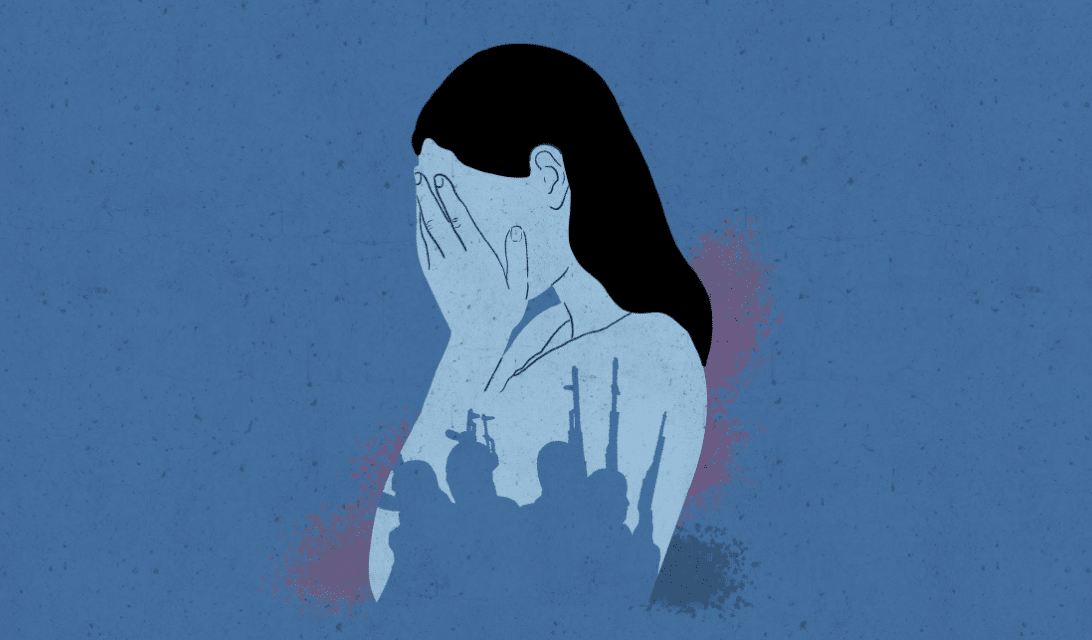Handcuffed and dazed, she struggles to exit the trunk of the Jeep. She’s barefoot and limping. She’s bleeding near her temple. Her ankle is cut.
Her grey sweatpants are bloodied. At gunpoint, she is dragged by her long brown hair into the vehicle. A crowd looks on. The car speeds off.
That is the last time, captured in a video taken on Oct. 7, that Naama Levy, 19, was seen alive. She is among 17 female hostages aged 18 to 26 still held by Hamas somewhere in Gaza.
Their families fear the worst.
“Time is running out for Naama,” said Levy’s mother Ayelet Levy Shachar. “Time is running out for the vulnerable young women being held hostage at the hands of those who torture and abuse them.”
Shachar was referring to the mounting evidence of rape, sexual violence and mutilation of women and men during the Hamas attacks in southern Israel on Oct. 7.
But sexual assault appears not to have been confined to Oct. 7. Two Israeli doctors, who have been treating released hostages, and an Israeli military official familiar with the matter confirmed to USA TODAY that some released hostages revealed they suffered violent sexual assaults in captivity.
[The USA Today Report continues]
“My mother almost fainted here (during the cabinet meeting), because she knows what’s going on there. She saw what was done to men,” said the daughter of another freed hostage.
The Israeli military official said that, just as authorities know that many women were sexually assaulted during the Supernova music festival and at their homes on Oct. 7, “we know they were raped in Hamas captivity.”
Why were the Hamas attacks so brutal?Were the killers high on the drug Captagon?
[The USA Today Report continues]
Thirty-three American senators wrote a letter in mid-December to U.N. Secretary General António Guterres urging the international body to launch an immediate independent investigation into Hamas’ use of sexual assault on Oct. 7. Volker Turk, the U.N.’s high commissioner for human rights, has claimed that Israel has blocked his team’s investigators.
Five volunteers and first responders who collected and helped identify the bodies of those killed during the attacks on Oct. 7 said they observed multiple signs of obvious and incontestable sexual assault. This included women naked from the waist down, with their legs splayed or underwear torn. USA TODAY was shown photographs and video that appeared to corroborate these assertions, which have been backed up by forensic pathologists.
“We went from house to house and never knew what were going to find,” said Nachman Dickstein, a volunteer for ZAKA, a search and rescue group that works close with Israel’s military and government.
Israeli medical professionals and morgue workers said many women who died on Oct. 7 were found with broken legs and pelvic bones. They said that the severity of the mutilations they examined were such that it was not always possible to distinguish female from male victims. At least one survivor of the attack who was at the Supernova music festival on Oct. 7 near Gaza has told Israel police that she witnessed a gang rape.
Despite this evidence, Hamas has consistently denied accusations it used sexual violence on Oct. 7. It has claimed the allegations are part of an attempt by Israel to distract from its mass killings of civilians in Gaza. International human rights groups waited two months before finally condemning the sexual violence.
[The USA Today Report continues]
“We are living in this believe-all-women era, and somehow that philosophy vanished very quickly when we’re talking about Israeli women,” she said. “It’s really hard not to see that as ingrained antisemitism, ingrained bias that leads people not to want to believe these voices.”
Still, one of the doctors treating the freed hostages said establishing whether sexual assault has taken place is not a straightforward exercise. For a start, physical evidence in the form of body fluids, cuts and bruises can disappear quickly while verbal testimony from victims can take months, years and even decades to materialize.
“The first few days after the hostages were released, they mostly talked about how they lacked adequate food. Then they started to talk about how kids were separated and left in isolated rooms on their own. Then they talked about the aggressiveness of Hamas and how some of the sick and elderly were refused their medications. Finally it was physical violence. It was step-by-step, which is usually how sexual violence testimony goes.”
The doctor said it took decades in Israel before soldiers who were abducted and sexually assaulted during the 1973 Yom Kippur War between Israel and a coalition of Arab countries led by Egypt and Syria started talking about their experiences.
[The USA Today Report continues]
Later, they may encounter something – a particular place, person or event, for example – that acts as a trigger and enables them to recall specific information that has been stored away in their brain about the assault, Hopper said.
Defense attorneys will often point to a victim’s delayed memory recall or inconsistencies in those recollections to try to cast doubts on the victim’s credibility. But research suggests that as few as 5% of reports of sexual assault are false, Hopper said.
Chen Goldstein-Almog, a freed hostage who was held by Hamas in Gaza, told Israeli broadcaster Kan that three women held hostage with her told her stories of being sexually abused by their captors.
However, Goldstein-Almog, 48, did not indicate whether she herself was sexually assaulted.
One of the doctors treating freed hostages said one of the clearest pieces of evidence for how the hostages who remain in captivity may be being treated by Hamas is Levy, the bloodied 19-year-old woman who was caught on video being bundled into the back of the Jeep at gunpoint.
Shachar, her mother, said she struggles to watch the video of her daughter, who she has described as a “joyful” sweet-natured character who likes to dance with her friends, enjoys athletics and dreams of a career in diplomacy.
Each moment is the most indescribably gripping pain Shachar has ever felt. Her heart is shattered. Her nights are haunted by the absence.
Contributing: Michael Collins and Maureen Groppe. Illustrations by Veronica Bravo/USA TODAY.
View this USA Today Report from December 20th

